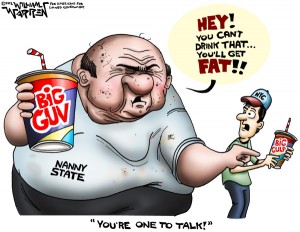
Trumpeted by the time-honored Pollyannaish rallying cry “we’ve got to do something,“ Bloomberg’s beverage ban includes numerous Nanny State staples: lost freedom, a diminished free market, higher costs to businesses and consumers and hefty government fines for non-compliance.
There’s also a moral imperative, a convenient enemy (the evil soda lobby) and plenty of condescending logic.
“The idea here is you tend to eat all the food in the container in front of you,” Bloomberg said in announcing his plan. “If it’s a bigger container, you eat more. If somebody put a smaller glass or plate or bowl in front of you, you would eat less.”
Even if this premise were legitimate, it is no more government’s prerogative to make serving size decisions for its citizens than it is to dictate where they dine or what color clothes they wear to the restaurant.
Bloomberg’s “War on Soda” is just one small facet of this caloric communism, though. Last month at a ritzy conference in Washington, D.C., the administration of Barack Obama released a 478-page report which predicted that 42 percent of the U.S. population would be obese by the year 2030 — 11 percent morbidly so. This report also projected that keeping obesity rates at their current levels over the next two decades would save taxpayers $550 billion in health care costs.
Naturally, the Obama administration wants to achieve these “savings” by launching a full-scale War on Obesity. This massive taxpayer-funded campaign would involve multiple government agencies, numerous programs, new regulations and fresh tax hikes — all built around the fundamental notion that American citizens are no longer capable of making good dietary decisions on their own.
“People need to make healthy choices, but the healthy choices must first be available and accessible,” a bureaucrat at the Centers for Disease Control recently observed, adding that it was up to government to develop “proven, effective strategies and solutions … to help make the healthy choice the easy choice.”
And what are these “proven, effective strategies?” Not surprisingly, government is proposing a veritable smorgasbord of Keynesian interventionism that touches literally every facet of American life.
For starters there’s a proposed national levy on soda (perhaps as high as a penny-per-ounce) aimed at limiting consumption of these sugary beverages. Government also wants to tinker with its costly farm subsidy program in the hopes of easing restrictions on the planting of fruits and vegetables. That’s right: As it turns out, Washington’s existing command economic policies have contributed mightily to the dearth of “healthy choices” in America — yet another example of government creating a problem it can later “solve.”
Another anti-obesity recommendation calls for new urban renewal projects — including sidewalks, trails and parks all subsidized by tax dollars and tax credits. There are also proposed zoning changes that seek to fundamentally alter commuting patterns so as to facilitate greater public exertion.
Finally, the War on Obesity would make underperforming government schools the so-called “heart of health” in America — heaping yet another non-instructional burden on top of a system that continues to fall further behind its international peers. Not content with teachers sacrificing valuable lesson time to indoctrinate students on the dangers of “global warming,” this proposal would require our primary and secondary schools to devote 60 minutes per day to physical activity.
How much will all of these new programs cost? The report doesn’t say — although it’s safe to assume that implementing them will eat up a healthy chunk of the $550 billion in “savings” referenced earlier. And there is no guarantee that people will stop drinking soda, start eating more fruits and vegetables or get more exercise based on these reforms. After all, most people are too busy trying to make ends meet to even think about exercising or counting calories.
Nonetheless his new battleground — like government’s failed “War on Poverty” or its ongoing crusade against the myth of climate change — seeks social experimentation and market manipulation on a grand scale. And though it claims to focus on “cutting the fat,” its real objective is clearly to expand government’s power over our lives and increase its influence over our choices.
America’s obesity epidemic is an undeniably serious and costly problem — one that’s getting worse by the day. But top-down government policies contribute to that problem every bit as much as individuals making bad choices — and government’s insistence on subsidizing expensive medical care for those who fail to restrain their appetites sends the powerful message that such excess can be indulged without consequence.
The author is chairman of Americans for Limited Government.







